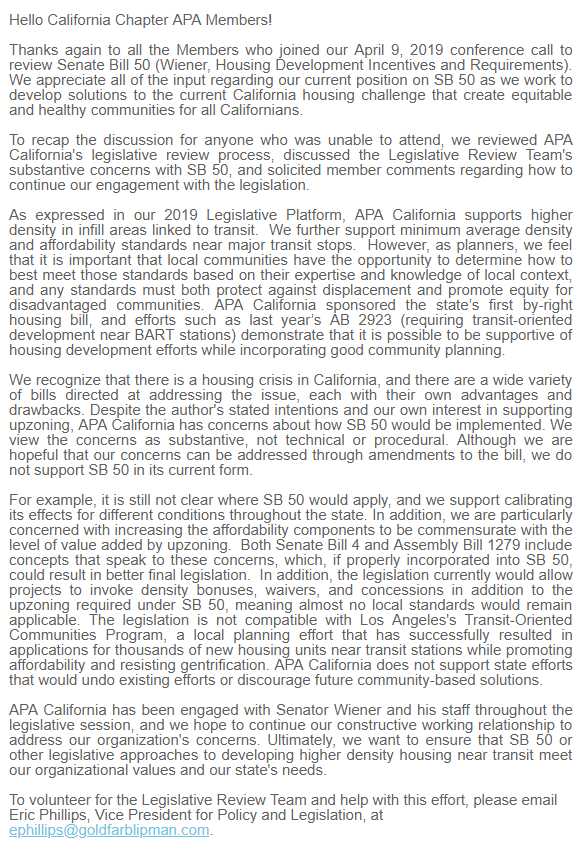East Village, City of San Diego
In a letter sent out to members of their California Chapter, the American Planning Association lays out why, in its current form, the APA has “substantive, not technical or procedural” concerns with the legislation.
The letter summarizes the discussion from a conference call with members on April 9th to discuss SB50 and incorporates some of the findings from a previous letter to Senator Weiner (SB50 – Notice of Oppose unless Amended) on March 25th. In essence, while the APA supports the basic tenets of the legislation as it is aligned with their legislative platform—to increase density in infill areas linked to transit—they have significant concerns with the implementation.
Lack of specificity and local granularity: “It is not clear where SB50 would apply and we support calibrating its effects for different conditions throughout the state.” The definition of job-rich, in particular is what the APA is most concerned about as it doesn’t define what it means in the language of the legislation and basically punts it to HCD (Housing and Community Development) and the OPR (the Governor’s Office of Planning and Research). The jobs-rich areas are intended to be areas of high opportunity but low housing density near jobs but are not as well defined as transit-rich areas (1/2 or 1/4 from transit stops).
Limited Land Value Recapture: In recognizing that up-zoning confers additional value to the landowners whose land is up-zoned, they feel that the affordability component is not commensurate with the value created for developers. e.g. if we’re going to grant all this value to developers and speculators, the public should obtain a greater benefit. And in Weiner’s letter, they state the added importance of requiring onsite affordable versus simply allowing developers to pay an in-lieu fee as the legislation proposes.
Limiting community input into development process: “as planners, we feel that it is important that local communities have the opportunity to determine how to best meet those standards based on their expertise and knowledge of local context, and any standards must both protect against displacement and promote equity for disadvantaged communities.”
Almost no local standards will be applicable: After density bonuses, waivers and concessions are applied to projects per the legislation, there will effectively be no local standards that will apply to the projects, according to the APA.
Makes good local planning toothless: LA’s Transit-Oriented Communities Program, which has been extremely successful in creating thousands of units near transit while promoting affordability and limiting gentrification would be rendered ineffective by SB50.
Does this mean they won’t support the bill ever? No. If Senator Weiner makes some significant changes to the bill, they might consider it.
Letter to Membership:

JOIN OUR MAILING LIST TO BE KEPT UP TO DATE ON THE LATEST IN SAN DIEGO LAND USE AND HOUSING ANALYSIS




